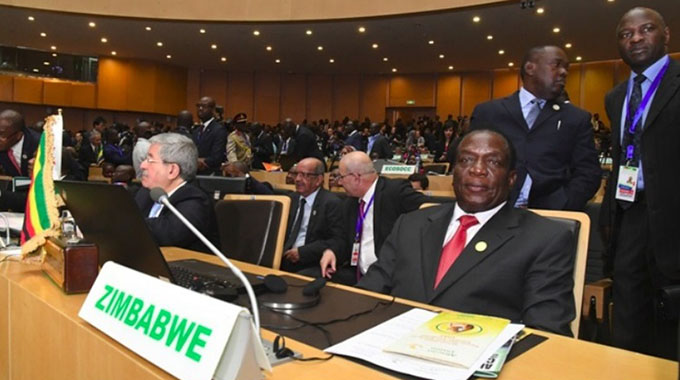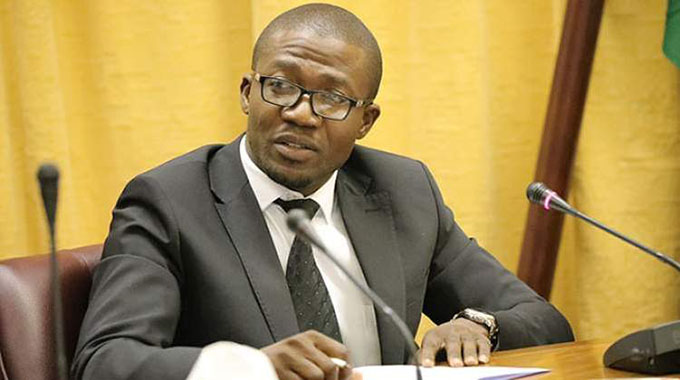AU self-funding route to redemption

Elliot Ziwira Senior Writer
Self-funding of the African Union (AU) may be the Holy Grail that the continent desperately needs to redeem herself from the whipping boys’ snare and establish herself as a force to reckon with in global politics.
President Mnangagwa had this to tell his counterparts at the 32nd Ordinary Session of the AU Assembly in Addis Ababa, Ethiopia:
“Funding remains a major constraint that we face as a Union, which must be a priority in the reform process. It is imperative that member states share the financial burden of our Union through the timeous payment of dues. Let us wean ourselves from the donor dependency syndrome and strive to fund our own agenda, programmes and activities in line with the decision taken in June in Johannesburg, South Africa.”
Highlighting that Zimbabwe was committed to play her part by timeously paying her dues, President Mnangagwa added: “I wish to encourage others to do the same. Our commitment and sacrifices for the sustenance of the Union should be matched by the effective and efficient management of resources by the African Union Commission (AUC) and other organs of the Union.”
At the 27th Summit in Rwanda in 2016, the AU’s 2017 draft budget was tabled as $781 million, of which $569 million was expected from foreign donors, while the 54 African countries were to contribute only $212 million, translating to about $4 million per country.
This has always been the case over the years that the AU budget is disturbingly sponsored to the tune of 72 percent by cooperating partners, of which the United States and her cronies contribute 60 percent, leaving members to meet the remaining 28 percent. Such a situation is unsustainable for any independent family as it robs it of its sovereignty and gags its voice.
The bulk of Malawi’s budget, for example, is donor funded and as a result of that it may not be off the mark to say that the wishes of the Malawian people are compromised.
This hypocrisy on the part of the empire confines the post-colonial state in the intensive care unit as it loses more than it gains through plunder disguised as aid. There really is no innocent aid.
It is this giving without reciprocity that Ayi Kwei Armah is contemptuous of in “Two Thousand Seasons” (1973), which Kwame Nkrumah takes a swipe at in his Consciencism philosophy, and which Mbembe (2001) sneers at, because Africa pays back for the aid in “several ways”.
And one of the “several ways” in which the continent pays is through loss of sovereignty. Doyen Cheikh tells His Excellency Leon Mignane in Ousmane Sembene’s “The Last of the Empire” (1981) that, “Our Independence is being usurped . . . We pay too high a price for that aid, Leon.”
Through dependence on the empire’s aid, Africa remains burdened and appended to Europe and America, without the wherewithal to map its own destiny going forward. The former colonial power remains influential in the former colony, which places a wedge between African countries. They will not speak with one voice, seeing as they clandestinely cooperate with Europe
It is against this backdrop that former president Robert Mugabe decided to shame the West in its backyard, especially the British government for reneging on their promise pertaining to the land issue as enshrined in the Lancaster House Agreement, calling the agreement a mere piece of paper, yet there are a lot of such pieces of paper the deceitful hypocrites want Africa to respect. The Pact Colonial between France and the 14 Francophone African countries immediately comes to the fore.
The heinous pact requires the African countries, which were formerly colonised by France, to deposit 65 percent of their foreign currency reserves in the French Treasury. The hard to accept fact that these countries have no individual monetary policies as everything is pinned on the CFA franc points to the baneful nature of neo-colonialism, which the continent should collectively lambasts.
Riding on the wave of such a crest, Zimbabwe’s and, indeed, Africa’s detractors seek to derail the continent’s train to prosperity through realisation of the true value of her resources.
Notwithstanding the predicament of scoffing at glossed aid, the continent’s heads of state should find means to steer the African ship to glory, and central to that is self-funding of the AU budget.
It is this that President Mnangagwa advocates by reminding his fellow African leaders that the continent’s destiny is in its hands. The West may vilify him, demonise him or even crucify him and rubbish whatever he stands for, but the statesman is an icon and a hero to Africa. His actions, desires and words are reflective of what the continent yearns for, but have of long pretended not to; for fear of irking Big Brother, who holds the carrot stick.
The African story has to be told, for it is the story of toil, displacement, oppression and plunder.
That Africa is endowed with vast mineral resources is as true as the fact that the colonial world was developed through their pillage; but sadly the continent remains poor and lies prostrate on the ground as erstwhile colonisers rape her willy-nilly.
Western hegemony that seeks to continue the subjugation of the once physically and emotionally colonised should be seen as it is – a poisoned chalice.
Land has always been a people’s pride, and it remains so, because without ownership of it development continues to recede to the horizon. It is the womb to aquatic, mineral, agricultural and other natural resources making it scum doggery to wish away any struggles for the repossession, or simply possession of the land.
History has it on record that colonisation reduced the legitimate owners of the land to subsistent croppers, who barely exist beyond the tag of peasantry, on barren land; with the minority whose belief in the superiority of their race is legendary occupying vast tracts of arable land.
In Zimbabwe, for instance, colonial laws saw to it that 70 percent of the land belonged to about 4 000 white progenies and only 30 percent was to be shared among the 13 million blacks, who ironically are the legitimate owners. In South Africa 84 percent of the land is still in the hands of the beneficiaries of apartheid, with only 13 percent controlled by the government on behalf of the black majority, whose population is more than 50 million, and one percent is not clearly accounted for.
Africa has come of age, and gone are the days it is given multiple voices to represent it. The exportation of raw minerals or any other resources should be done away with. Value addition and beneficiation should be the new norm.
Whoever wants to trade with Africa should be prepared to meet the continent’s terms, because there is no freedom without ownership of the means of production. Impoverished democracy is not what is yearned for, but a better standard of living for the majority in a world where diseases are not manufactured to decimate presumed inferior races; where the mouth always precedes action; where every human being is given a chance regardless of race, creed or nationality; where the so-called global village is not hijacked by thieving gangs; where wars are not manufactured to create anarchy and chaos as a way of plundering others’ ancestral resources; where the power of mighty is checked to ungag the voices of the feeble and vulnerable; mutilated, displaced and molested in full view of all and sundry over generations of stoic submission; where the word “terrorism” is not used selectively, and where every soul’s dreams are respected.
Such a world is what Africa needs as is manifest in President Mnangagwa’s words when he calls for self-reliance, accountability and prudent use of the motherland’s resources. It is this that the continent needs, to carry the gargantuan basket of her children’s dreams and hopes. And such a decision should not only be respected by a progressive world, but will function as a milestone that goes a long way in redefining the continent’s aspirations.
Time, indeed, is now for Africa to glow in the limelight of global economic and political phenomena, as she redeems herself from the world’s punch bag and free- for-all tag.










Comments